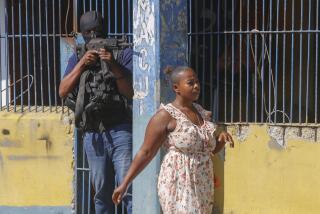HAITI : Embargo May Be Lifted Even Without President’s Return
- Share via
PORT-AU-PRINCE, Haiti — The Organization of American States, quietly backed by the United States, is offering to ease, if not to lift the international embargo against Haiti’s renegade regime without assurances that the nation’s ousted president will be restored to office, diplomatic and Haitian officials say.
The OAS plan to modify the embargo will be outlined next week when Joao Baena Soares, the agency’s secretary general, and U.N. officials arrive here for talks to end the crisis that erupted after the Sept. 30 military overthrow of President Jean-Bertrand Aristide, Haiti’s first democratically elected chief of state.
The shift away from what was called a total embargo is being offered even though diplomats and Haitian experts say OAS and American officials know such a change will not bring Aristide back from exile.
“I don’t sense any willingness by either the military nor Aristide’s people to back away,” one European diplomat said, a sentiment echoed by Aristide advisers and military leaders. “Lifting the embargo won’t bring back Aristide, and I don’t think it will scare Aristide into relenting, either.”
Over the 10 months of crisis, the army and its civilian front-governments have sabotaged all negotiated efforts on a possible formula to restore Aristide, even if he accepted, as he has said he would, less authority over the government. For his part, Aristide has refused to meet with current government leaders. He has demanded that the embargo go on, despite growing international conviction that it does more harm than good.
The military’s hard-line position was upheld earlier this month when Brig. Gen. Raoul Cedras, army commander in chief and coup leader, told Radio Canada that, while he could accept democracy in Haiti, Aristide can never return as president. Still, OAS and other diplomatic and business sources say, Baena Soares will propose relaxing the boycott in selected sectors such as private consumer goods and some petroleum products.
In reality, the United States on its own has quietly been redefining the list of banned goods to permit several previously outlawed items, including propane and some industrial raw materials.
Beyond these measures, there has been a not-so-subtle shift in private descriptions by American officials about what should be expected of Haiti regarding democracy. In contrast with public demands that nothing short of Aristide’s return is acceptable to the Bush Administration, the thinking privately appears to be that it is not America’s role to re-create a U.S.-style democracy in Haiti, and it is futile to expect Haiti, overnight, to develop a system that is free of corruption, violence and autocracy.
For such reasons and to simply extract themselves from what is seen as a no-win situation, the OAS and United States will settle for what one source described as “vague assurances from the government” that negotiations will continue on Aristide’s future.
The military-backed de facto government of Prime Minister Marc Bazin will be asked to permit the stationing of U.N. observers to monitor the human rights situation.
At the same time, increased American pressure is being applied to Aristide to drop his refusal to deal with Bazin or face the withdrawal of American support of the embargo.
More to Read
Sign up for Essential California
The most important California stories and recommendations in your inbox every morning.
You may occasionally receive promotional content from the Los Angeles Times.













